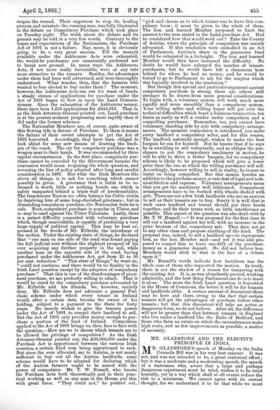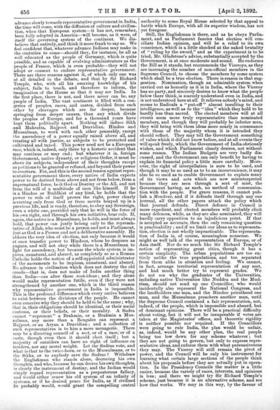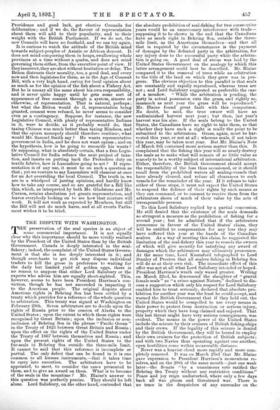MR. GLADSTONE AND THE ELECTIVE PRINCIPLE IN INDIA.
it/ER. GLADSTONE'S speech of Monday on the India Councils Bill was in his very best manner. It was not, and was not intended to be, a great oratorical effort ; but it was a moderate and a moderating speech, the speech of a statesman who, aware that a large and perhaps dangerous experiment must be tried, wishes it to be tried honestly, yet in a way which shall at all events reduce the risk to a minimum. We cannot agree with its central thought, for we understand it to be that while we must advance slowly towards representative government in India, the time will come, with the diffusion of culture and civilisa- tion, when that European system—it has not, remember, been fully adopted in America—will become, as it were, of itself the governing system of the continent. We dis- believe that entirely, and think it more frank to say so. We feel confident that, whatever advance Indians may make in the centuries to come—should they, for instance, be all as well educated as the people of Germany, which is quite possible, and as capable of evolving administrators as the people of France, which is even probable—they will not adopt or consent to endure representative government. There are three reasons against it, of which only one was at all detailed in the debate, and that by Sir Richard Temple, who, with all his amazing knowledge of his subject, fails to touch, and therefore to inform, the imagination of the House so that it may see India. In the first place, there is not, and there never can be, any people of India. The vast continent is filled with a con- geries of peoples, races, and castes, divided from each other by cleavages which are far deeper, because springing from deeper causes, than any which divide the peoples of Europe, and for a thousand years have kept them politically apart. Nothing will induce Sikh .and Mahratta, Rajpoot and Dravidian, Hindoo and Mussulman, to work with each other peaceably, except the ascendency of a power equally raised above all, and treating all with justice, as subjects to be protected and cultivated and taxed. This power need not be &European race, which is, indeed, only there by a historic accident that may continue or may end ; but whatever it is, foreign Government, native dynasty, or religious Order, it must be above its subjects, independent of their thoughts except as petitions to be granted or refused, and beyond their power to overturn. For, and this is the second reason against repre- sentative government there, every native of India expects power to be derived from above and not from below, from a supernatural force, be it God or Destiny or the All, and not from the will of a multitude of men like himself. If he is a Hindoo or Buddhist of any kind, he holds that the power to rule of itself proves the right, power clearly accreting only from God or from merits heaped up in a previous life, and is ready, therefore, to obey any Sovereign, even a white one, provided only that he will in the force of his own right, and through his own initiative, bear rule. If, again, the native is a Mussulman, he holds, and must always hold, that power can justly belong only to the represen- tative of Allah, who must be a person and not a Parliament, just as God is a Person and not a deliberative assembly. He abhors the very idea of election, not only because it would at once transfer power to Hindoos, whom be despises as pagans, and will not obey while there is a Mussulman to fight for ascendency, but because the whole system is im- pious, unnatural, and absurd, as completely so as a Roman Catholic holds the notion of a self-appointed administrator of the sacraments to be impious, unnatural, and absurd. No advance in civilisation which does not destroy the old creeds—that is, does not make of India another thing than India can alter these root-ideas ; and they alone would make representation futile, even if they were not strengthened by another one, which is the third reason why representative government in India is impossible. This is the profound difference which every native believes to exist between the divisions of the people. He cannot even conceive why they should be held to be the same ; why, that is, their obligations should be identical, or their social customs, or their beliefs, or their morality. A Sudra cannot " represent " a Brahmin, or a Brahmin a Mus- sulman, any more than a Bengalee can represent a Rajpoot, or an Aryan a Dravidian ; and a collection of such representatives is to him a mere menagerie., There may be a directing council of a sect, or of a race; or of a caste, though even then it should elect itself ; but a majority of outsiders can have no right of influence on insiders, nor any moral weight. Let the Sudras vote, and what is that to the twice-born, or to the Mussulmans, or to the Sikhs, or to anybody save the Sudras ? Withdraw the Englishman who stands alone, decreeing his own thoughts, and who, because he can decree his own thoughts, is clearly the instrument of destiny, and the Indian would simply regard representation as a preposterous fallacy, and would either renew his old system of an infinity of systems, or if he desired peace for India, as if civilised he probably would, would grant the compelling central authority to some Royal House selected by that appeal to battle which Europe, with all its superior wisdom, has not yet foregone.
Still, the Englishman is there, and as he obeys Parlia- ment, and as Parliament fancies that election will con- ciliate Indian opinion, and will be a relief to its own conscience, which is a little shocked at the naked brutality of "ruling by the sword," and as the experiment is to be tried, Mr. Gladstone's advice, substantially accepted by the Government, is at once moderate and sound. He endorses the Bill as it stands, but recommends the Viceroys, as they are increasing the number of non-official members in the Supreme Council, to choose the members by some system which shall be a true election. There is reason in that sug- gestion. Nomination, though an admirable system when carried out as honestly as it is in India, where the Viceroy has no party, and sincerely desires to know what the people below there think, is scarcely understood even in India, and is not understood here at all. It relieves nobody's mind, and seems to Radicals a " put-off " almost insulting to their intelligence, as well as to the " idea " which they hold to be hardly less than sacred. The elected members will at all events seem more truly representative than nominated members, and though they will probably be inferior men, they will bring with them ideas more nearly in consonance with those of the majority whom it is intended they should reflect. They may tell the Government something of value which it did not know before, and at all events they will speak freely, which the Government of India obviously wishes, and which Parliament clearly desires, not without some reason. The Indian Budgets are very badly dis- cussed, and the Government can only benefit by having to explain its financial policy a little more carefully. More- over, the right of interpellation is sure to be used, and though it may be so used as to be an inconvenience, it may also be so used as to enable Government to explain many of its views and acts which are now misinterpreted because they are seen through a sort of mist, the Government having, as such, no method of communica- tion with the people. For grave reasons, it cannot pub- lish a Mcmiteur, and if it defends itself through any one journal, all the other papers attack the policy which that journal defends. Direct defence in Council is more expedient, and elected members will probably elicit many defences, while, as they are also nominated, they will hardly carry opposition to an injudicious point. If that is accepted as accurate, then the only remaining question is practicability ; and if we limit our ideas as to representa- tion, election is not wholly impracticable. The representa- tion of India is, of course, meaningless nonsense. We might as well talk of the representation of Europe, or of Asia itself. Nor do we much like Sir Richard Temple's notion of representing great cities, though it has a certain simplicity. The urban populations are too en- tirely unlike the true populations, and too separated from them alike in situation and feeling. We cannot, in fact, arrange territorial representation of any sort, and had much better try to represent grades. We do not see why the graduates of the Universities, including native Universities like Nuddea and the Mud- rasa, should not send up one Councillor, who would incidentally also represent the National Congress, and the landholders one man, and the Hindoo priesthood one man, and the Mussulman preachers another man, until the Supreme Council contained a fair representation, not, indeed, of the people, which is impossible and absurd, but of dominant opinions. There will be a practical difficulty about voting, but it will not be insuperable if votes are taken at the Magistrates' offices, and theoretic rigidity is neither possible nor required. If the Councillors were going to rule India, the plan would be unfair, as, indeed, would be any other plan, the real people being too low down for any scheme whatever ; but they are not going to govern, but only to express repre- sentative ideas, and enforce them with what persuasiveness they may. The Viceroy will still remain the pivot of power, and the Council will be only his instrument for learning what certain large sections of the people think about his proposals before they are actually put in opera- tion. In the Presidency Councils the matter is a little easier, because the variety of races, interests, and opinions is less; and there we might try Sir Richard Temple's scheme, just because it is an alternative scheme, and see how that works. We may in this way, by the favour of Providence and good luck, get elective Councils for deliberation ; and if we do, the flavour of representation about them will add to their popularity, and to their weight with the British Parliament. If we do not, the new Councils will have no foothold, and we can try again. It is curious to watch the attitude of the British mind towards subject-peoples of Asiatic or African descent. It does not mind conquering them in heaps, swallowing whole provinces at a time without a qualm, and does not mind governing them either, from the executive point of view. If they insurrect, they are shot without hesitation or delay. The Briton distrusts their morality, too, a good deal, and every now and then legislates for them, as in the Age of Consent Bill, with a very high hand, caring for local opinion about as much as for the opinion of the fish about a Fishery Act. But he is uneasy all the same about his own responsibility, and is never quite happy until he gets some sort of appearance of free consent through a system, sincere or otherwise, of representation. That is natural, perhaps ; but what the Briton would do if, representation being granted, consent were refused, he never seems to consider even as a contingency. Suppose, for instance, the new Legislative Council, with plenty of representative Indians in it, were to decide, as it probably would do, that taxing Chinese was much better than taxing Hindoos, and that the opium monopoly should therefore continue, what would Mr. Samuel Smith say ? He wants representative government in India, and he does not want opium ; and on the hypothesis, bow is he going to reconcile his wants ? Or supposing, what is absolutely certain, that a free Legis- lative Council for India refuses the next project of taxa- tion, and insists on putting back the Protective duty on textile fabrics, how is Lancashire going to act ? If repre- sentation is of any use, it must be on such a question as that ; yet we venture to say Lancashire will clamour at once for an Act overriding the local Council. The truth is, we are in a whirlpool of jarring opinions, and hardly know how to take any course, and so are grateful for a Bill like this, which, as interpreted by both Mr. Gladstone and Mr. Curzon, retains absolutism yet grants representation, and leaves everybody looking on to see how that mixture will work. It will not work as expected by Members, but still the Bill will not do much harm, and at all events Parlia- ment wishes it to be tried.




































 Previous page
Previous page